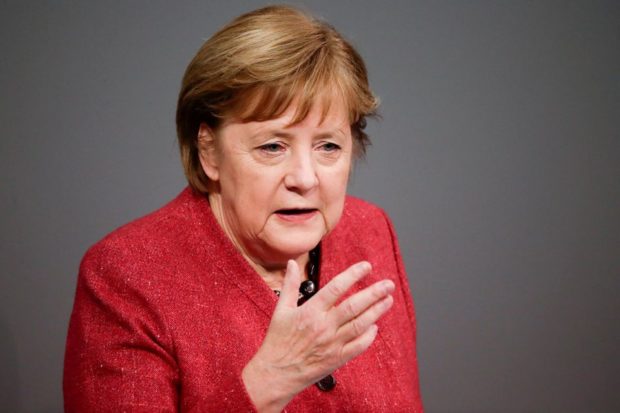Merkel defends 2008 decision to block Ukraine from Nato

Former German chancellor Angela Merkel gestures as she delivers a speech in the country’s parliament, the Bundestag, in Berlin, Germany, December 9, 2020. REUTERS
BERLIN — Former German chancellor Angela Merkel on Monday defended her 2008 decision to block Ukraine from immediately joining Nato, rejecting President Volodymyr Zelensky’s criticism as Russia’s invasion clouds her 16-year legacy.
Zelensky in a night-late address had described as a “miscalculation” a Franco-German-led decision at the Nato summit in Bucharest to not admit his country to the alliance despite a push from the United States.
“I invite Ms Merkel and Mr (Nicolas) Sarkozy to visit Bucha and see what the policy of concessions to Russia has led to in 14 years,” he said, referring to the alleged atrocities against Ukrainian civilians by Russian troops that world powers have described as “war crimes”.
The Ukrainian president also accused the European leaders of seeking to appease Russia with their stance then.
But Merkel in a short statement issued by her spokeswoman said she “stands by her decisions in relation to the 2008 Nato summit in Bucharest”.
Article continues after this advertisement“In view of the atrocities uncovered in Bucha and other places in Ukraine, all efforts by the government and the international community to stand by Ukraine’s side and to bring an end to Russia’s barbarism and war against Ukraine have the former chancellor’s full support,” added the spokeswoman.
Article continues after this advertisementGermany had deemed it too early for Ukraine to join Nato in 2008 because it found that the political conditions were not met at that point.
Merkel, who retired from politics late last year after four consecutive terms in power, had once been hailed as the leader of the free world.
But Russian President Vladimir Putin’s war on Ukraine has exposed flaws in her legacy, with critics saying she left Germany and Europe vulnerable with her detente policy towards the Kremlin leader.
‘Mistake’
Under particular scrutiny is Germany’s reliance on Russian energy, which made up 36 percent of its gas imports in 2014 but which rose to 55 percent by the time of the February 24 invasion.
The dependence on Russian power has left Berlin saying it is unable to follow a call by the US and other allies to impose a full energy embargo on Moscow.
President Frank-Walter Steinmeier, who served as foreign minister in two of Merkel’s cabinets, on Monday admitted that he made a “mistake” in pushing for Nord Stream 2, the controversial pipeline built to double Russian gas imports to Germany.
“My adherence to Nord Stream 2 was clearly a mistake. We were holding on to bridges that Russia no longer believed in and from which our partners had warned us about,” he said, according to German media reports.
The United States and EU members like Poland had deeply opposed the 10-billion-euro ($12 billion) pipeline which bypasses Ukraine, depriving Kyiv of gas transit fees.
After obstinately defending it through its construction, Germany finally put the project on ice following Russia’s invasion of Ukraine.
Like Merkel, Steinmeier has come under fire over the pipeline project. His Social Democrats in particular have over the years pushed for closer ties with Russia.
Merkel’s predecessor Gerhard Schroeder, a Social Democrat, has refused to quit key posts at Russian energy giants Rosneft and Gazprom despite Putin’s war on Ukraine.
Admitting his miscalculation, Steinmeier said his “assessment was that Vladimir Putin would not accept the compete economic, political and moral ruin of his country for his imperial madness.”
“Like others, I was wrong.”
RELATED STORIES
Russia says ‘unfriendly’ German expulsion of diplomats will worsen ties
Zelensky calls Russian troops murderers, outarage grows over ‘war crimes’
War in Ukraine: Latest developments